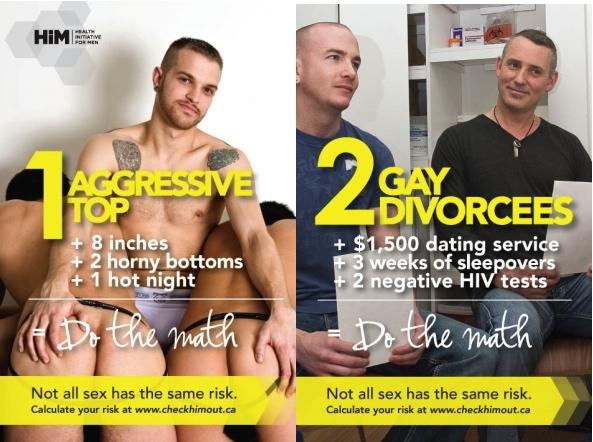Do the math. Calculate your risk.
That’s the catchy title of a new ad campaign the Health Initiative for Men (HIM) is rolling out for gay men seeking more information than the standard “use a condom every time you have sex” refrain.
Initially, it was going to be a condom campaign, HIM project coordinator Jody Jollimore says, but that approach quickly morphed into a more nuanced campaign about risk.
Among the campaign’s key messages: “Not all sex has the same risk. Your risk of picking up or passing on HIV depends on the kind of sex you’re having and who you’re having it with.”
“What we’re finding is that while the questions on the surveys ask, ‘Are gay men having unprotected anal intercourse?’ — and while that number seems to be increasing — infections are not increasing in the same rate as risk-taking,” Jollimore explains.
“So what it means is that gay guys are finding other ways to reduce the risk, not just using condoms anymore,” he continues. “They’re using testing practices to determine whether they’re both negative or both positive — they’re finding people who have the same status as them.”
Do the Math presents eight different scenarios showcasing 16 local gay men in higher- and lower-risk situations in order to target the widest possible demographic of men who have sex with men.
“Instead of looking at this [as] group think — like if not everyone wears a condom, we’re going to transmit HIV — we’re trying to look at individual situations and say what’s going on in [a particular] scenario,” Jollimore elaborates.
The idea is not to privilege a particular kind of hookup or relationship, he says. “People are really happy with the complexity of it — that it’s not a simple one-fits-all message.”
Jollimore says the campaign is the brainchild of a volunteer advisory committee that included young men, older men, HIV-positive and -negative men, people with expertise in social marketing and an understanding of gay male demographics.
“Go to the website,” urges HIM executive director Wayne Robert. “We really do hope people go there and find that information, and find it useful, and find it really makes a difference for them.”
“Often [this area of health] is characterized as being incomprehensible, and there’s so many messages out there that have come and gone, and I think people really get fatigued about it,” Robert notes.
“One of the things I feel I can say to people about this is that they will find that it is respectful of their lives. It’s respectful of their ability to make their own decisions,” he says.
Vice-chair of the BC Persons with AIDS Society Ken Buchanan says the campaign is going to make people “stop for a second and think about what they’re doing.”
He hopes the campaign will prompt people to think about their own health, their partners’ health, wearing condoms and getting tested.


 Why you can trust Xtra
Why you can trust Xtra


